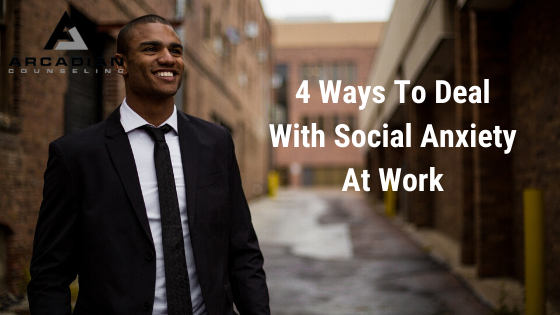According to the Anxiety and Depression Association of American about 7% of the American population suffers from Social Anxiety Disorder. Social Anxiety Disorder, also referred to as Social Phobia, is an intense fear of social situations.
People with Social Anxiety Disorder or Social Phobia believe they could become humiliated or embarrass themselves somehow in front of other people. They tend to focus on every little mistake they make (or could conceivably make) and assume that everyone else is judging them. This fear leads to a life filled with damaged relationships, impacted careers, loneliness, sadness, and more.
The most common form of Social Anxiety is giving a public presentation. Did you know that the number one fear of all people around the world is public speaking? That’s right, more people are scared to get up in front of others and speak than they are to die!
Shyness vs Social Anxiety Disorder
People often confuse shyness with Social Anxiety Disorder, but they are very different. While a shy person may be a bit uneasy around others, they generally don’t experience the same intense feelings of anxiety as someone with an actual social phobia. Shy people also don’t go to extreme measures to avoid social situations. However, those with Social Anxiety Disorder will often do anything to avoid being in a social gathering.
Symptoms of Social Anxiety Disorder
- Extreme and persistent fear of one or more social or performance situations where a person is exposed to scrutiny or other unfamiliar people.
- Panic attacks at the mere thought of the social situation.
- The person recognizes the fear as excessive or irrational but still cannot control their feelings.
- The social situation is avoided at all costs.
- The irrational fears affect the persons everyday life and interferes with career and personal relationship growth.
Dealing with social anxiety at work
If your social anxiety is interfering with your career goals, here are four ways you can deal with it:
Meditate
Meditation has been scientifically proven to calm a person’s nerves. Now, I’m not talking about “clearing the mind” or any of that. By simply being still and focusing on your breath for just 10 minutes each day, you can learn to settle yourself in the face of anxiety and stress. The more you practice facing anxiety and stress and learning how to make space for it in your life, the less overwhelming and intense it will feel. Then, engaging in life’s activities that are meaningful and important to you, are not so burdensome.
Focus on performance, not feelings
People who suffer from social anxiety tend to focus solely on how they feel during a social setting, not the positive things that may happen. When you focus on what you don’t want and are afraid of, you are ensuring unpleasant feelings. When you focus on how well you’ve done, you start to forget about your nerves and engage in the moment.
During your next meeting, don’t focus on whether or not you are blushing or sweating, you can’t control that anyway (and the more you focus on it, the more you will). Just focus on making good eye contact with everyone in the room. THIS, you can control. When all is said and done, you will feel better that you made such an accomplishment.
Try and be realistic
It’s important to be realistic in the face of your anxiety. For instance, if you’ve given speeches in the past and have done well, then it’s unrealistic to tell yourself that you’re “going to bomb.” Instead tell yourself, “I’ve done well in the past, I’m very prepared, and I will do a good job.”
Visualize yourself delivering the performance of a lifetime, not tripping and falling flat on your face. Michael Jordan never visualized missing the big shot right before he took it.
Work with a therapist
If social anxiety is derailing your relationships or career, then it’s time to get some help from a well-trained therapist who specializes in anxiety disorders. They can teach you coping strategies and skills so you can learn to create space for the anxiety that you have no control over. They can teach you how to stop struggling and start living in a way that’s moving you toward the life you really want.
Life is too short to spend it struggling with anxiety. If you find yourself in the midst of “the struggle” too often, find a skilled therapist you connect well with to help you go From Surviving To Thriving.
James Killian, LPC is the Principal Therapist & Owner of Arcadian Counseling in New Haven, CT where they specialize in helping over-thinkers, high achievers, and perfectionists take control and move From Surviving to Thriving.





